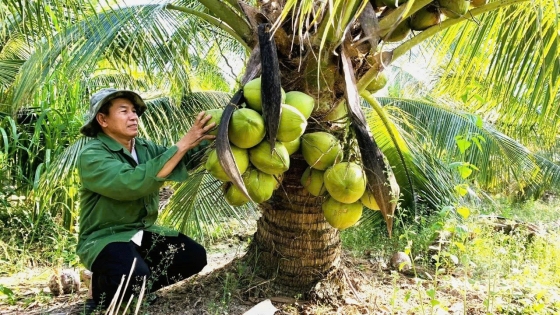(VAN) The year 2024 marks remarkable achievements for the coconut industry in Ben Tre province, paving the way for positive developments ahead.
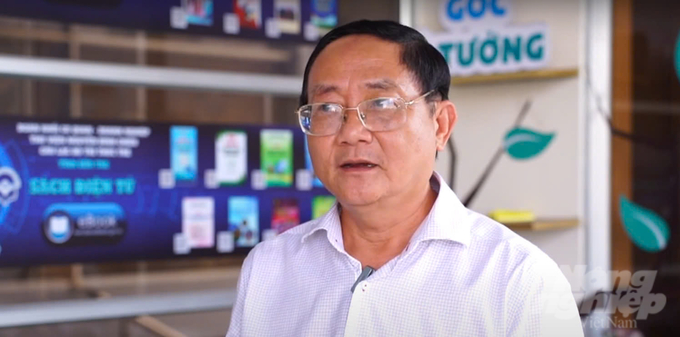
According to Mr. Doan Van Danh, Director of the Department of Agriculture and Rural Development, 2024 is the year marking remarkable milestones for the province’s coconut industry. Photo: Nguyen Khang.
The key crop of Ben Tre
Coconut is a traditional plant in Ben Tre, playing a significant role in local economic development. The year 2024 highlights the most notable achievements of the coconut industry in Ben Tre province in particular, and the country in general.
Mr. Doang Van Danh, Director of the Department of Agriculture and Rural Development, shared that the province has been implementing the directives of the provincial authorities. The locality has focused on the establishment of concentrated production areas and the development of value chains for key agricultural products. In particular, the expansion of coconut product value chain models has been increasingly successful, and production models following GAP and organic practices have flourished.
By the end of 2024, Ben Tre province’s coconut area is expected to reach 80,000 hectares, accounting for 42% of the total coconut area in the country and around 88% of the coconut area in the Mekong Delta region, with an output of 708 million fruits. The province has selected and recognized over 9,700 mother coconut trees.
The province has 32 cooperative groups and 34 cooperatives participating in the value chain linkage, covering an area of 13.3 hectares with 6,600 members. The organic coconut production area reaches 20,400 hectares (around 25% of the total area of the province), with 13,000 hectares certified according to the standards of the US, Japan, EU, China, South Korea, and Taiwan.
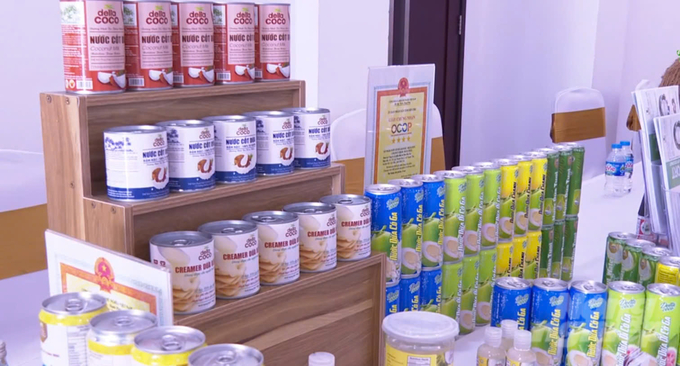
Ben Tre coconut products are increasingly diversified in the market. Photo: Nguyen Khang.
The coconut processing industry in Ben Tre consumes around 85.7% of the total coconut output in the province. Ben Tre is home to around 180 enterprises and nearly 2,400 production facilities, processing a wide variety of coconut products. These products are sold in more than 90 countries and territories. The production and processing value of coconut in 2023 reached VND 3.75 trillion, and the export turnover of coconut in 2023 reached USD 420 million, accounting for 27.45% of the province’s export turnover.
A pathway wide open for export
Mr. Doan Van Danh stated that 2024 is truly a milestone year for Ben Tre province’s coconut industry, opening up positive developments and greatly contributing to the socio-economic development of the province.
On January 26, 2024, the Ministry of Agriculture and Rural Development (MARD) issued Decision No. 431 on the approval of the Scheme for Key Industrial Plant Development by 2030, identifying coconut as one of the six key industrial crops of the nation.

The Ben Tre pineapple industry is increasingly moving towards deep processing to increase value. Photo: NNVN.
On that basis, Ben Tre authorities established and issued Planning No. 2710 on the implementation of the Scheme to develop key crops (coconut) in the province by 2030, promoting the existing strengths of coconut trees, and continuously enhancing the output, quality, and economic efficiency of coconut gardens.
In August 2024, the Ben Tre Provincial People’s Committee hosted and collaborated with Can Tho University and the Ministry of Science and Technology to successfully hold a scientific seminar on the coconut commodity industry titled “Green and Sustainable Development of Ben Tre, Towards Net Zero.” The seminar introduced new and significant value for coconut, highlighting the carbon-storing potential of coconut trees, actively contributing to the set targets of reducing greenhouse gas emissions and orienting towards low-carbon production.
On August 19, MARD Vietnam and the General Administration of Customs of China signed three protocols to export Vietnam’s agricultural products to the Chinese market. Coconut is one of the three products eligible for official export to this billion-populace market.
Ben Tre province has 133 basic cultivation areas meeting production conditions according to current regulations, with registration for production unit codes for exported fresh coconut covering nearly 8,400 hectares and involving 12,800 households. These are important figures and represent the material area that meets the requirements of the protocol on plant quarantine for fresh coconut exported from Vietnam to China.
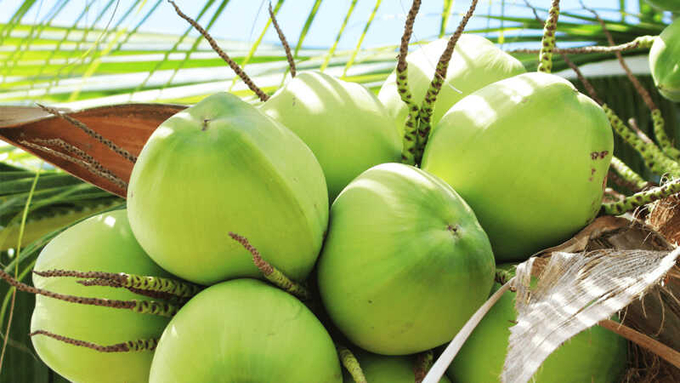
Ben Tre coconut is facing many opportunities to expand export markets. Photo: TL.
Mr. Doan Van Danh noted that global demand for coconut products has been rising, with processed coconut products being exported in increasingly large volumes and turnover. Products from coconut exported to Asian countries account for the largest proportion, followed by Europe and America, while markets such as China, Japan, and South Korea have seen rapid increases.
Incorporating coconut trees with eco-tourism
According to Mr. Doan Van Danh, the development goals of the coconut industry in the province for the period 2024-2025 have been completed. For the period 2026-2030, the locality will continue developing a stable coconut area of around 80,000 hectares, including 25,000 hectares of organic coconut and 6,000 hectares with production unit codes.
To achieve these targets, the province focuses on reorganizing and reforming production mechanisms, prioritizing quality and professionalism, creating high-quality products, and enhancing competitiveness. It also focuses on the stable and sustainable development of concentrated production areas, following organic and circular principles, emphasizing origin traceability based on sustainable value chain linkages, and building local OCOP products.
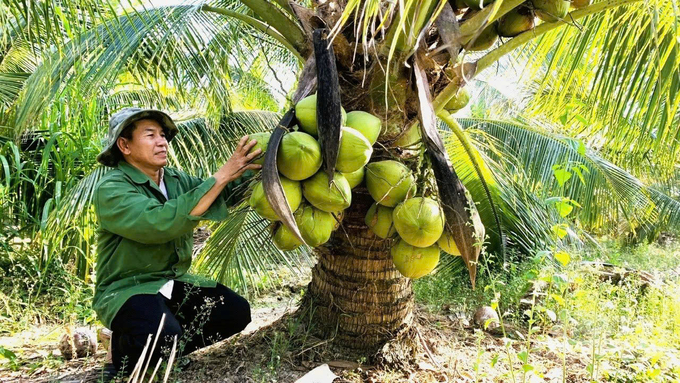
Coconut acreage in Ben Tre province is increasing. Photo: Nguyen Khang.
The province will strengthen investment promotion for deep-processing projects, diversifying high-added-value products that incorporate technological and scientific content to participate in the global production and supply chain. It will also elevate the effectiveness of the combination of agriculture and tourism by developing tourism products, coconut garden spaces, and eco-tourism, contributing to the branding of “River Eco-Tourism of Ben Tre Coconut Land.”
Focusing on branding and trade promotion, the province aims to establish an active and strong enterprise ecosystem in the coconut value chain, maintaining a central role in connecting markets. Especially with the CO2 absorption capacity of coconut, the province will collaborate with other units in scientific and technological programs to achieve Net Zero’s goal, contributing to Vietnam’s commitment to reducing greenhouse gas emissions and towards sustainable development.
Agriculture News | Agri Products Price



